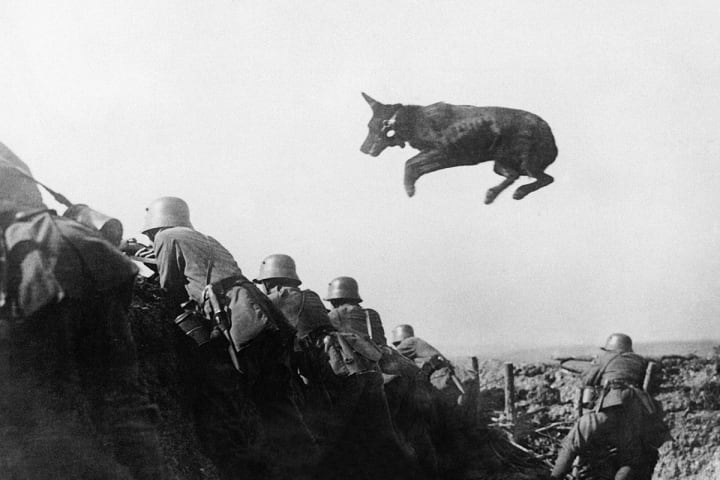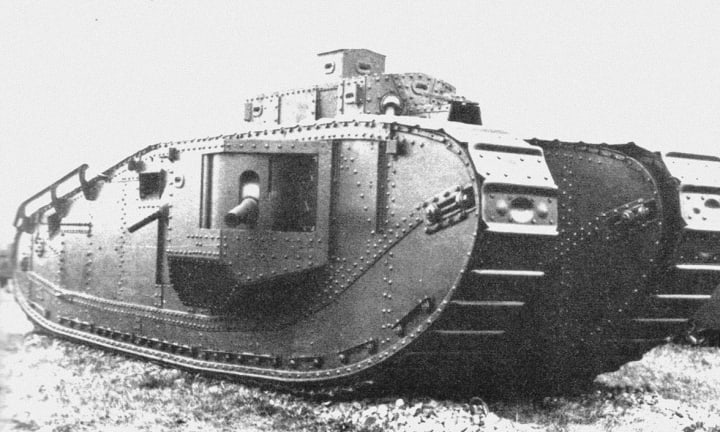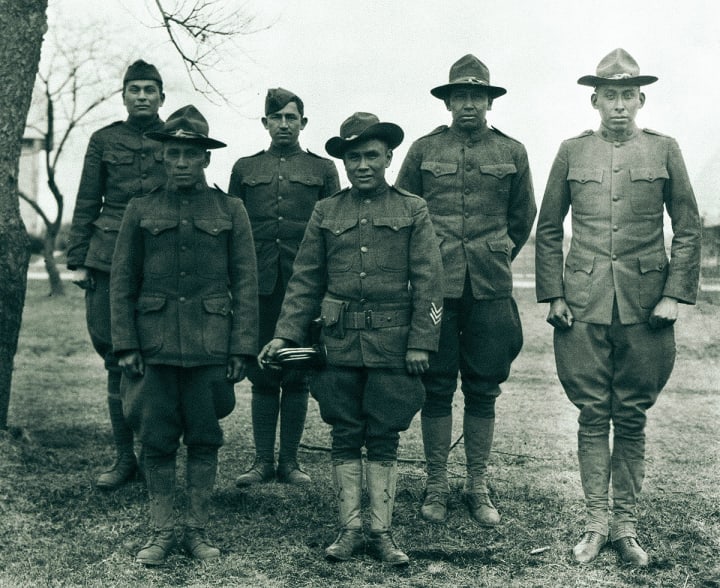Little Known Facts You've Never Heard About WWI
While WWI may have annihilated ancient alliances, toppled titanic regimes, and shattered several soldiers' psyches, there remain so little that the public knows about the War to End All Wars: World War I.

Everyone knows about World War II, down to the little facts and trivia about the guns used and the soldiers who fought, but many remain in the dark about the Great War: WWI. For a whole generation, World War I proved to be the most explosive, destructive conflict in man's history. Over the course of four bloody years, WWI crushed empires, carved lakes into the Earth, and left countries carpeted by fields of corpses rasping out their last through blood and gas.
Yet many don't seem to know anything about the war that ended nearly forty million lives. While WWI may have annihilated ancient alliances, toppled titanic regimes, and shattered several soldiers' psyches, there remain so few facts that the public knows about the War to End All Wars: World War I.

- Miners under France detonated bombs to devastate the war front above. The explosions could be heard and felt from England.
- British journalists at the war front were regarded as such a nuisance and hazard to soldiers that some were actually arrested and risked execution by the British War Office.
- Women who worked to produce TNT often developed jaundice, which gave them yellow skin and eyes.
- Two billion letters and 114 million packages were delivered over the course of WWI.
- Reconstructive and plastic surgery kicked off thanks to WWI when soldiers would return home so viciously mutilated that they'd ask for surgery to restore their original appearances.

- The youngest British soldier was Sidney Lewis. He was twelve when he enlisted, and became part of the Machine Gun Corps. He survived the war, and served as Bomb Disposal in WWII. He died in 1969, the owner of a fine pub.
- WWI broke the British economy, which would lead to the eventual collapse of its empire and the destabilization of government throughout Africa that still plagues various countries to this very day.
- Rather than camouflage themselves, merchant ships would decorate themselves in outlandish colors to confuse enemies into not firing on them.
- Many generals wanted to fight alongside their men, but were barred because their experience with war was invaluable to the war efforts.
- In 1914, a temporary truce occurred between the numerous factions of the war to celebrate Christmas. It was the only successful occurrence of the like in modern warfare. When soldiers attempted to repeat the Truce, sentries on both side were ordered to shoot them through their skulls.

- In August 1914, German soldiers were ordered to fire on the civilians of Aerschot. They killed 150 civilians. This was part of their Schreklichkeit Policy, where they would terrify civilians into blind obedience. It worked.
- Germans were the first to use flamethrowers in WWI.
- The Pool of Peace is a 40' lake in Belgium. It is actually a crater left by British forces when they detonated 45 tons of explosions.
- Dogs relayed messages along the front lines.
- Throughout Europe, prejudices and anxiety about foreigners spread. Eastern European cultures, in the eyes of France, Britain, and Germany, started the wars, and other cultures, such as the Hebrew people, were perceived to profit most from the war. This would lead to the atmosphere of WWII.

- Tanks were originally called "landships," but the name was changed so that, should the enemy hear about them, they'd confuse the obvious weapon of death as a water storage unit... or a tank of water.
- Woodrow Wilson, after campaigning for President with the motto "He kept us out of the war," entered WWI a month after entering office.
- In early 1917, British cryptographers intercepted a message from the German foreign secretary and the Mexican president, encouraging Mexico to invade the United States. The British withheld the information until the right moment to get the US into the war.
- Anti-German sentiment in America led to German books being banned, the slaughter of German Shepherds, the murder of one German-American, and a complete shut-out of any performances of Beethoven.
- While WWI took all over the globe, most of the fighting was concentrated in Europe.

- Most ships sunk by German U-Boats were in the English Channel.
- France was the first country to use gas as a weapon in the War. In 1914, they threw tear-gas at German forces. Germany tried this against Russia, but the gas froze thanks to the Russian Winters.
- The Germans released 68,000 tons of poisonous gas throughout WWI, while the British and French combined released 51,000 tons. 1.2 million soldiers were gassed, and over 91,000 suffered grotesque, cruel deaths.
- In an emergency, if a soldier did not have a gas mask, they were told to piss in a rag, and drape it over their mouth to protect themselves from the gas.
- After the War, poisonous gases were outlawed as cruel and unusual weapons of war.

- Before America officially joined the war, many Americans, infuriated by America refusing to join, enlisted in the British armies.
- "Hello Girls" were female telephone operators who helped with war communications and were fluent in French and English. They would not be recognized for their efforts until 1979, by which point few still lived.
- Much like how people tried and failed to rename French Fries as Freedom Fries back in the early 2000s, during WWI, Hamburgers were renamed Salisbury Steak and frankfurters were named Freedom Sausage. It didn't catch on after the War.
- 13,000 Native Americans fought in the War, even though the United States Government refused to even recognize them as citizens.
- Even though 200,000 African Americans served in WWI, only 11 percent of them saw combat. The rest were assigned to work transport. The 11 percent who did see combat were completely segregated from white soldiers.

- Edith Cavell was a nurse who helped soldiers on both sides of the war front. When she helped save 200 Allied Soldiers, the Germans captured her, and executed her by firing squad. The cruelty of this act turned the entire world against Germany.
- Mata Hari was a Dutch exotic dancer accused of being a spy. When the French executed her by firing squad, she blew the soldiers a kiss—one last act of defiance.
- Alvin Cullum York led an attack on a German firing nest. He captured 32 machine guns, killed 28 Germans, and captured over 120 more. For this and many other actions, he became the most highly decorated soldier in the war.
- The legendary Red Baron (Manfred Albrecht Freiherr von Richthofen) was a German fighter pilot who, before being shot down in 1918, took down 80 Allied aircraft.
- T. E. Lawrence, otherwise known as Lawrence of Arabia, worked as part of the Allied Intelligence in the Middle East. He led a rebellion of Arabs against the Turks as part of the British war front. Tragically, the alliance of Arabian tribes was short lived, but the effort helped change the war front of WWI.

- Russia refused to pay France and Britain back for any of its debts accumulated during the war. As a result, the countries entered an economic depression after the war.
- WWI resulted in the creation of Finland, Poland, Estonia, Latvia, and Lithuania, which emerged from the fragmented remains of other crumbling empires.
- The Hundred Day Offensive was the bloodiest "battle" of the war. In actuality, it was a series of battles that forced Germany out of France. There were over 1,800,000 casualties.
- The Spring Offensive was the second most bloody battle. It was Germany's final attempt to destroy the Allied forces. While it pushed German forces deep into Allied territory, the force of a million American soldiers eradicated the front, and left the German Empire vulnerable to attack. The offensive took over 1.5 million lives.
- Numerous smaller conflicts occurred in the years directly following WWI (going as late as 1923 with the Turkish War of Independence), mainly over the redrawn country borders and new political institutions. None of them count as part of WWI.

- Most soldiers suffering from crippling shell-shock (PTSD) never received treatment. Many died after the war from refusing to eat or drink anything.
- The Ottoman, Austro-Hungarian, German, and Russian Empires collapsed following the war.
- The Tsar and his family were murdered by Socialist Revolutionaries in the last year of the war, keeping Russia out of the war as it came to a close. Contrary to popular rumors, Anastasia Romanov, daughter of the Tsar, never escaped. Her corpse was found brutally slaughtered in a ditch decades later. It is unclear if she was stabbed repeatedly with bayonets, shot to pieces by bullets, or had her skull beaten in by repeated strikes. She was seventeen.
- The Harlem HellFighters were one of the few African American units to ever fight on the front lines. The French Government rewarded them for their heroism and bravery. America refused to acknowledge them.
- Even though Germany did not cause the war, the League of Nations, during the Treaty of Versailles, forced Germany to pay for all the damages caused by the war. Germany could not pay any of the debts, which left the country impoverished. Starvation ran rampant throughout the country. Countless businesses failed. Germany's depression was many times worse than America's Great Depression. The effects of the Treaty would later lead to the rise of the German National Socialist Party... otherwise known as the Nazi Party.
About the Creator
Anthony Gramuglia
Obsessive writer fueled by espresso and drive. Into speculative fiction, old books, and long walks. Follow me at twitter.com/AGramuglia






Comments
There are no comments for this story
Be the first to respond and start the conversation.